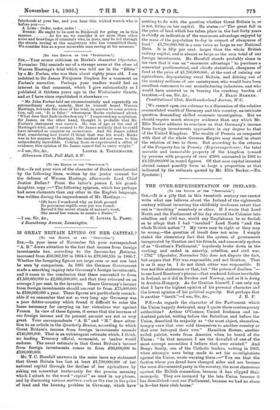IS GREAT BRITAIN LIVING ON HER CAPITAL ?
[TO THE EDITOR Or THE " SPECTATOR."] SIR,—In your issue of November 7th your correspondent " A. B." draws attention to the fact that income from foreign investments has, according to the Income-tax itetur•ns, increased from £66,062,109 in 1904-5 to £79,560,116 in 1906-7. Whether the foregoing figures ar•e large ones or• not can best be seen by comparison. In 1905 the German Government made a searching inquiry into. Germany's foreign investments, and it came to the conclusion that these amounted to from £1,500,000,000 to £2,000,000,000, and that they returned on an average 5 per cent. to the investor•. Hence Germany's income from foreign investments should amount to from £75,000,000 to £100,000,000 a year. These figures are particularly remark- able if we remember that not so very long ago Germany was a poor debtor-country which found it difficult to raise the loans necessary for carrying on her victorious war against France. In view of these figures, it seems that the increase of our• foreign income and its present amount are not so very great. Your correspondents " A. B." and " H." draw atten- tion to an article in the Quarterly Review, according to which Great Britain's income from foreign investments exceeds £140,000,000. That is an extravagant estimate which, I think, no leading Treasury official, economist, or banker would endorse. The usual estimate is that Great Britain's income from foreign investments comes to from £80,000,000 to £100,000,000.
Mr. T. C. Horsfall answers in the same issue my statement that Great Britain has lost at least £1,700,000,000 of her 'national capital through the decline of her agriculture by asking me somewhat irrelevantly for the precise meaning which I attach to the word " capital " as used in my phrase, and by discussing various matters. such as the rise in the price `of land and the housing problem in Germany, which have
nothing to do with the question whether Great Britain is, or is not, living on her capital. He states :—" The great fall in the price of land which has taken place in the last forty years is chiefly an indication of the enormous advantage enjoyed by the mass of the population to-day in respect of cheapness of food." £1,700,000,000 is a sum twice as large as our National Debt. It is fifty per cent. larger than the whole British railway capital, and is almost as large as the sum total of our foreign investments. Mr. Horsfall stands probably alone in his view that it was an " enormous advantage " to purchase a somewhat problematical, and chiefly statistical, cheapness of food at the price of £1,700,000,000; at the cost of ruining our agriculture, depopulating r•ur•al Britain, and driving out of the country millions of our countrymen who would have been excellent customers to our• manufacturing industries, and who would have assisted us in bearing the crushing burden of [We cannot open our columns to a discussion of the relative accumulated wealth of Germany and this country, an intricate question demanding skilled economic investigation. But we should require much stronger• evidence than any which Mr. Ellis Barker• adduces to convince us that Germany's income from foreign investments approaches in any degree to that of the United Kingdom. The wealth of Prussia as compared with that of the whole German Empire may stand in about the relation of two to three. But according to the returns of the Property-tax in Prussia (Ergdnzungssteuer), the total movable and immovable property of the kingdom (owned by persons with property of over• £300) amounted in 1901 to £4,120,000,000 in round figures. Of that sum capital invested abroad cannot possibly form so large a proportion as that indicated by the estimate quoted by Mr. Ellis Barker.—En. Spectator.]










































 Previous page
Previous page